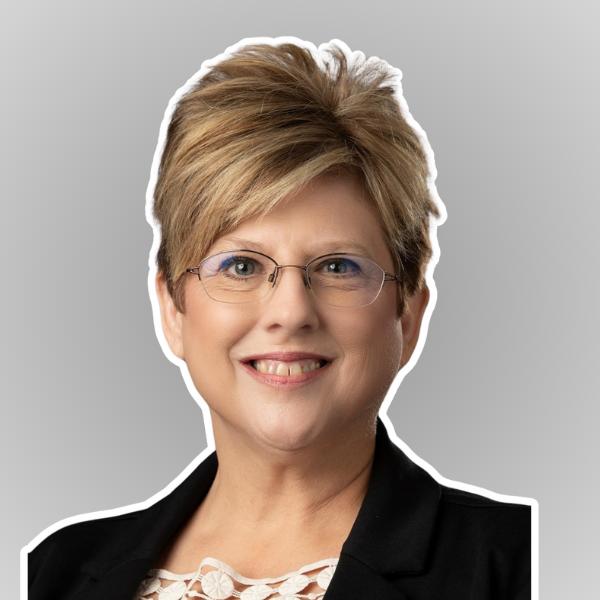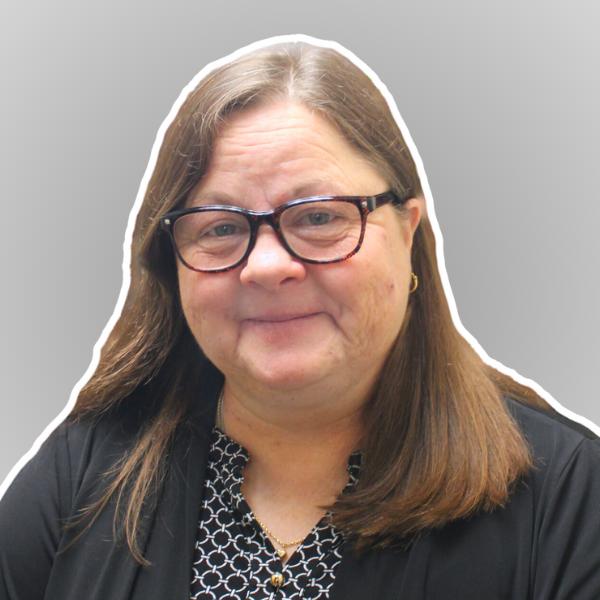
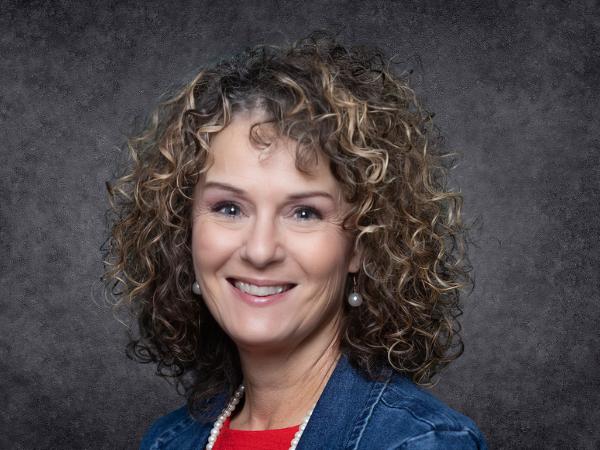



Dr. Megan Duncan Executive Director m.duncan@theaaea.org
Dr. Karla Neathery Assistant Executive Director k.neathery@theaaea.org
Sharon Chuculate Fiscal Services Coordinator s.chuculate@theaaea.org
Sarah Shamburger Business Manager s.shamburger@theaaea.org
Alyse Mattox Communications & Technology Specialist a.mattox@theaaea.org
Melanie Thrasher Business Analyst m.thrasher@theaaea.org
Lana Webb Membership & Certification Coordinator l.webb@theaaea.org
Molly Franxman Administrative Assistant office@theaaea.org
Mike Mertens Consultant m.mertens@theaaea.org
Lenett Thrasher Consultant l.thrasher@theaaea.org
AAFC Fall Conference, September 17-19, 2025
Hot Springs Convention Center
ArkASPA Fall Conference, September 23, 2025
Benton Event Center
ASPMA Conference, September 29-October 1, 2025
Hot Springs Convention Center
October
AAGEA Conference, October 1-2, 2025
Benton Event Center
CASBO Classes, October 29-30, 2025
UCA Brewer-Hegeman Conference Center
November
AAEA Fall Conference, November 13, 2025
Benton Event Center
For more information, visit theaaea.org/events.
Charles Warren AAEA President Chief Financial Officer, Fort Smith
Dr. Debbie Bruick-Jones AASA President Superintendent, Bentonville
Shavon Jackson AAESP President-Elect Principal, Russellville
Melissa Powell ArkASPA President Assistant Superintendent & Director of HR, El Dorado
Justin Robertson AASBO Past President Chief Financial Officer, Russellville
Molly Davis AAMLA President Principal, Rogers
Dr. Megan Duncan AAEA Executive Director
Dr. Jason Reeves AAEA President-Elect and AASSP Past President Superintendent, Mountainburg
Dr. Jeremy Owoh AASA President-Elect Superintendent, Jacksonville/ North Pulaski
Steven Helmick AAESP Past President Principal, Little Rock
Shantele Raper AACTEA President Career & Technical Administrator, Rivercrest
Domonique Alexander AASEA President Special Education Supervisor, Fort Smith
Randall Bolinger ASPMA President (until Oct) Maintenance/Facilities Supervisor, Siloam Springs
Dr. Jared Cleveland AAEA Secretary Superintendent, Springdale
Dr. Karen Walters AASA Secretary Superintendent, Bryant
Jason Selig AASSP President Director of Instruction, Lake Hamilton
Lea Metcalf-McDonald AAFC President Director of Federal TexarkanaPrograms,
Dr. Kelli Martin AACIA President DeputyGreenbrierSuperintendent,
Raymond Reynolds ASPMA President (begin Oct) Maintenance/Facilities Supervisor, Searcy
Stacy DeFoor
AAEA Past President Assistant Superintendent, Sheridan
Betsy Laughter AAESP President Principal, Marion
Charles Nelson AASSP President-Elect Principal, Greene County Tech
Pam McCammon AASBO President BusinessGreenbrierManager,
Valerie King AAGEA President Director of Gifted Programs, Siloam Springs
B.J. TEL-ARBurgessPresident Director of GreenbrierTechnology,
Presidential
American Fidelity Assurance Co.
Bailey Education Group
Curriculum Associates
Educational Benefits
Lifetouch National School Studios
NIET - National Institute for Excellence in Teaching Solution Tree
Prestigious Cognia
Renaissance Learning
Stephens
Distinguished Apptegy
Arkansas Army National Guard
Capturing Kids’ Hearts
Coryell Roofing and Construction
Lexia Learning
The Kirkland Group
Diamond
Amazon Business
Baldwin & Shell
First Security Beardsley
Imagine Learning
OnToCollege
Phoenix Contractors
Platinum
AAMSCO
Architecture Plus
Arkansas Public Safety Solutions
C.R. Crawford Construction
Energy Systems Group
ESS
Hight Jackson Associates PA
HMH | NWEA
Just Right Reader
Legacy Construction Management
Nabholz | Entegrity Energy Partners
Polk Stanley Wilcox Architects
Powers of Arkansas
Progressive Technologies
Pro Service Builders
Reach University
TRANE
Gold
CDI Contractors
Cromwell Architects Engineers
Cynergy Rehab Group Goalbook
IXL Learning
Kinco Constructors
Middleton Heat and Air
Paragon Architecture
Red Comet
TIPS The Interlocal Purchasing System
White River Services and Solutions
WIlson Language Training
Silver
American Bus Sales Correll
French Architects, PA
K12 Tutoring
My Benefits Channel
SEAS
SmartData All-In-One Strategos Group


As we head back to school this August, we also mark a significant milestone in our educational journey, the 50th anniversary of the Arkansas Association of Educational Administrators (AAEA). The annual summer conference brings together school leaders from across Arkansas to collaborate, learn, and lead with a single shared purpose: to serve the children of our state.
This learning experience allowed us to reflect on the last five decades of progress and look boldly toward the future. Themed, “Legacy of Leadership: Building Tomorrow Together,” the conference honored the educators and administrators whose dedication shaped Arkansas schools and inspired generations of children. From breakout sessions on innovative instructional practices to keynote speeches on student data and leadership, the conference experience is always a powerful reminder of the strength of our shared commitment to public education and the children in Arkansas.
The celebration continues, as buses begin to roll, classrooms come alive, and the energy of a new school year begins, we return to what matters most, our children, who are ready to learn. The start of school is an affirmation of our belief that every child deserves a high-quality education, no matter the zip code.
At the heart of our new school year is a deep dedication to children. Whether leading in administration, in a classroom, driving a bus, or preparing meals in the cafeteria, we are united as Arkansas educators in our purpose. We are here to provide safe environments, rigorous instruction, quality professional development, and the support systems our students need to thrive.
As we celebrate 50 years of leadership and begin the 2025 - 2026 school year, may we carry forward the wisdom of the past, the energy of the present, and the vision for our future. Together, we continue to build a stronger, more hopeful Arkansas, by ensuring our children are educated.
Welcome back to school, and thank you for the extraordinary work you do.
Dr. Karla Neathery, AAEA Assistant Executive Director

One of our school board members got a new job and will be moving out of our district in September. What are the steps our district should take in appointing a new board member?
The school district board of directors has ninety days in all cases to fill a vacancy on the school board. At least thirty days before the vacancy is filled, the district must publish a notice of the vacancy along with information describing how to be considered for the position on their website and in the media. All qualified persons who submit a petition with the signatures of twenty qualified electors shall be considered and have not less than five minutes to address the board. Act 726 requires all discussions on appointments to be done in open session.
If you have questions for Dr. Neathery, email her at k.neathery@theaaea.org .
“Retention Is Our New Recruitment” Arkansas Education Leader Takes the Stage at NIET Summer Institute
by

At the National Institute for Excellence in Teaching’s Summer Institute this June, state, district, and teacher leaders came together to share insights on key issues in education. A standout panel at the event featured Karli Saracini, former Assistant Commissioner of Educator Effectiveness & Licensure at the Arkansas Department of Education and current NIET Executivein-Residence. Moderated by NIET CEO Dr. Joshua Barnett, the panel focused on teacher retention, professional pathways, and leader development. Saracini opened with a powerful message: “In Arkansas, retention is our new recruitment.”
How has Arkansas helped improve educational opportunities? “Our approach was to focus on three things: Bringing up base pay to $50,000, which was our focus on attracting teachers. We then focused on merit pay at the state level through legislation to incentivize our teachers to stay in the classroom. Third, we ensured there was a purpose for our career to continue. We want teachers to not only master their content but also lead other educators. Building capacity, establishing a career continuum through designations like our partnership with NIET, and providing compensation are key opportunities we provide as a state.”
How has Arkansas helped improve educational practices? “Our career continuum pathways, which are provided through a partnership with NIET, allow teachers to stay in the classroom while growing professionally. The Master Educator Pathway emphasizes content mastery, while the Lead Educator Pathway develops coaching and leadership skills. There is a real need for that Master and Lead Designation, and they are supporting our leaders in meeting the needs of teachers at different levels.”
After years at the Arkansas Department of Education, Saracini continues to make an impact in education - and that impact still hits home. Her work will continue to foster support and excellence in Arkansas education through NIET. “Sustaining and building new partnerships will directly inform my work with NIET as we enhance and improve leadership development across Arkansas,” Saracini said. “It is essential for this partnership between ADE and NIET to continue to grow and expand to build the capacity across the state for both Master and Lead Designated Professionals to meet the needs of all our districts.”
*Responses have been edited for clarity

Charles Warren, AAEA Board President
My first unofficial school position was as a summertime school custodian. My dad was the elementary principal and he had three healthy workers… I mean… sons. Our summer job was to move all the furniture out of the classrooms and then strip, scrub, and wax the classroom floors. What was our compensation? Our father’s love.
As a kid, it kept me busy and out of trouble. You probably recognize that your facilities team is very busy during the summer months. I’ve talked about hectic summer schedules for school business officials (SBOs). Well, the summer workload for facility staff is a close second.
They take advantage of the empty classrooms to put a real shine back on the schools. They are 12-month employees that truly work all 12 months because – to paraphrase a popular catchphrase from the 1980s –“dirt happens.” The grass grows, people litter, things break, kids throw up, and glitter gets everywhere. Facility management is a never-ending battle against a lot of elements.
I talked to Justin Robertson, the SBO at Russellville Public Schools and serves as the Chief Financial Officer (CFO). He’s a CPA like me with some serious cornhole skills. He spent some time (like a few other SBOs) overseeing operational departments including Facilities. I asked him a couple of questions about facility management from an SBO’s perspective.
He pointed out that the facility management leaders in Russellville are heavily involved with the Arkansas School Plant Management Association (ASPMA). This constituency group of AAEA is defined as “a professional education association open to all persons responsible for the management and day to day maintenance operations of the educational facilities.”

You may not know this, but ASPMA created the Certified Facility Director Program in 2012. Here’s what I found on the AAEA website about the program:
After consultation with the Arkansas Division of Academic Facilities and Transportation and reviewing similar certification programs in other states, a comprehensive program was developed to meet the needs of Arkansas school facility managers. In order to serve as the professional for their district in regards to the facilities in which the students learn, play, and dine, the facility manager should be certified in areas of health, safety, code compliance and cleanliness. The facility manager should also be knowledgeable in building systems, how those systems relate to each other to create the total building environment, and possess the skills necessary to properly manage the facilities.
If you spend any time with ASPMA members, they talk about the connection of their building to productive staff and students. Did you catch that? “Their building” - that’s how they talk – they take ownership of that school building. They understand that teaching and learning depends upon the warm, safe, and dry environments that they create.
Justin also shared about the importance they place on “preventive maintenance” at Russellville. Like most school districts, they utilize the Operations Hero software to prioritize and schedule building repairs and maintenance. SBOs like data and that’s a database demonstrating the important role of the facilities staff.
When I worked in the real world, our residential housing division taught me the term “deferred maintenance.” Deferred maintenance was such a problem that lenders required us to set aside funds each month in a bank account to cover major repairs and renovations.

Our real estate company spent a lot of time and effort emphasizing preventative maintenance to avoid the overlooked repairs becoming deferred maintenance. Believe it or not, allocating proper resources to pay for daily maintenance costs can often be more cost efficient than paying the bill on a deferred maintenance project.
From some legislators’ points of view, it appeared that more and more school districts were relying on insurance claim proceeds to address deferred maintenance items. Property insurance was paying for storm damage replacements and repairs to old roofs and heating, ventilation, and air conditioning (HVAC) equipment. They were concerned that this was the driving force of property insurance premium increases.
Whether or not their perceptions were reality, they created a state captive insurance program for all school districts. We all saw a sharp increase in our deductibles. Sadly, we did not see the expected decrease in annual premiums. We will wait and see how well they will handle future claims.
I think there is some validity for legislators to expect us to proactively address deferred maintenance. Their new approach will likely make all school districts begin to formulate a strategic plan to address aging buildings and equipment. To borrow from an old British expression, we have to “mind the gap” the change in deductible amounts have generated. I hope to create a “mind the gap” program in Fort Smith that I call “Strategic Plan to Replace & Upgrade Campus sites and Equipment” or SPRUCE. Feel free to steal that name before I trademark it.
Don’t tell anyone, but when I was a kid cleaning the classrooms, I would occasionally ride on the floor polisher that I called the scrubber. As I grew older, I got to run the scrubber. At first, I thought the scrubber required muscle to keep it from “flying off” in one direction. However, I learned that it simply required the right touch. Too much weight in the back or tilted forward led the scrubber to move wildly out of control. It was a balancing act to keep the scrubber and the scrubber pad in the desired spot.
SBOs and facility management leaders understand what it is to perform a balancing act. Both groups work together to spend funds effectively and purposefully on maintenance now to avoid the higher price tag of deferred maintenance in the future. I could “wax on” about the importance of proper facilities management longer, but I’ll stop. I’ve made my point and my pun. That’s how I like my puns – intended.
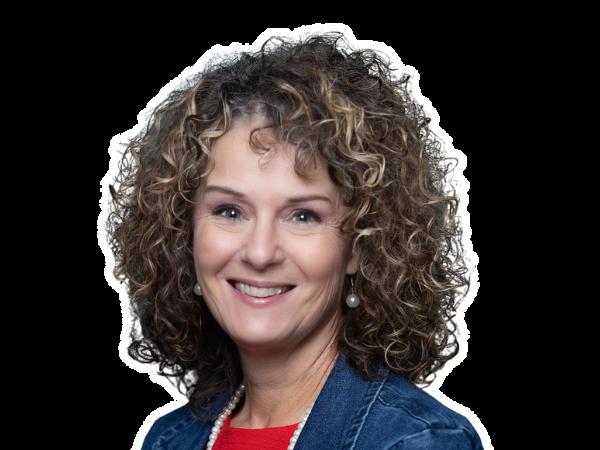
Jennifer Turner, CTE Coordinator for Guy Fenter Education Service Cooperative, says "I always wanted to work in CTE and had a love for Agriculture from my family's deep ties to Agriculture. It was a natural fit as both of my parents were employed in CTE related fields. It is all I really knew." She started her education career at Lincoln High School as an Agriculture Instructor. "I was able to intern and be hired to work with the legendary Dewayne Webb. His guidance, especially early in my career, provided me with the experiences and knowledge base to apply and be hired by the Ozark School District who were reinstating their Agriculture Program that had been dormant for 25 years." She taught in Ozark for 10 years and worked to complete her administrator degree and obtain her principal licensure. She was then hired in the CTE Department of the Guy Fenter ESC where she has worked to develop CTE programs for their 21 school districts.
Jennifer has seen several shifts over her career. She states, "When I started, careers and workforce development through education was a major focus and taught at every district. Then for several years, college degrees were promoted and students felt that going to college was the only way to be successful. Now the pendulum has shifted back, and we are seeing that students need to be career ready no matter what career path they choose. Our business and industries in Arkansas are providing students great opportunities with earning potentials above what most college degree careers offer."

Jennifer says she loves seeing students find a passion and realize their talents through CTE education. The most challenging part of her job is that the landscape with CTE is ever-changing. "We have to consider the needs of business and industry, so our programs are always evolving and changing to meet those needs and challenges," she explains. "Keeping all 21 districts up to speed with all the changes and For those considering the career, she advises to visit and learn about all the different CTE programs that are available. "Also, visit your post-secondary and learn about what opportunities are available to your districts," she continues. "Be involved with your stakeholder engagement so you can understand the workforce needs in your area."

When asked about what she feels is her greatest professional accomplishment, she says it's "the impact I’ve made through mentoring other CTE Coordinators and teachers, and helping elevate our region to be recognized as one of the strongest in the state. I take pride in fostering collaboration, sharing resources, and creating systems of support that empower educators and ultimately benefit students. Watching others grow in their roles—and knowing that our collective efforts are opening real-world opportunities for students—is the most fulfilling part of my career."
What is the best advice you have ever received?
Mr. Webb cautioned to be careful what you wish for because you just might get it. Think it all through. And that Rome wasn’t built in a day. Program development takes time and a lot of energy. Always take time to breathe and spend time with your family.
What might other administrators be surprised to know about you?
I was the first in my family to graduate college. CTE education and Agriculture helped me become confident and find my voice. I am very passionate about CTE and our Career and Technical Student Organizations and love the opportunities that our students have available.
What is the most daring thing you’ve done?
I have cliff dived. Probably wouldn’t do that a second time.


What do you enjoy doing during your time off?
I love animals and my favorites are my donkey Clyde and my naughty cat, Pete. I love landscaping and growing things, especially flowers. I find a lot of parallels in my roots in agriculture and how students can grow and achieve. My favorite thing to do is go fishing! I especially love trout fishing on the White and Little Red Rivers.
What is one of the things on your “Bucket List?”
I would like to go skydiving and I would like to travel abroad.
If you weren’t in your current position, what would you be doing?
I would be a veterinarian. Animals have also always been a passion of mine. I loved growing up on a farm and working with my grandparents. I loved doctoring animals and nursing them back to health.
When people look back at your life, how do you want to be remembered?
I want to be remembered as someone who was passionate about those things that were so important to me in my life- my faith, my family and my career. I met challenges head-on and didn’t back down when things were tough. I always try to treat people fairly and respect and value our differences.
What do you see as the biggest benefit of AAEA membership?
One of the biggest benefits of AAEA membership is the access to professional development resources and networking opportunities. Members can participate in workshops, conferences, and training sessions that enhance their leadership skills and knowledge in educational administration. Additionally, being part of a community of peers allows for the sharing of best practices and support, which can lead to improved outcomes and relationships.


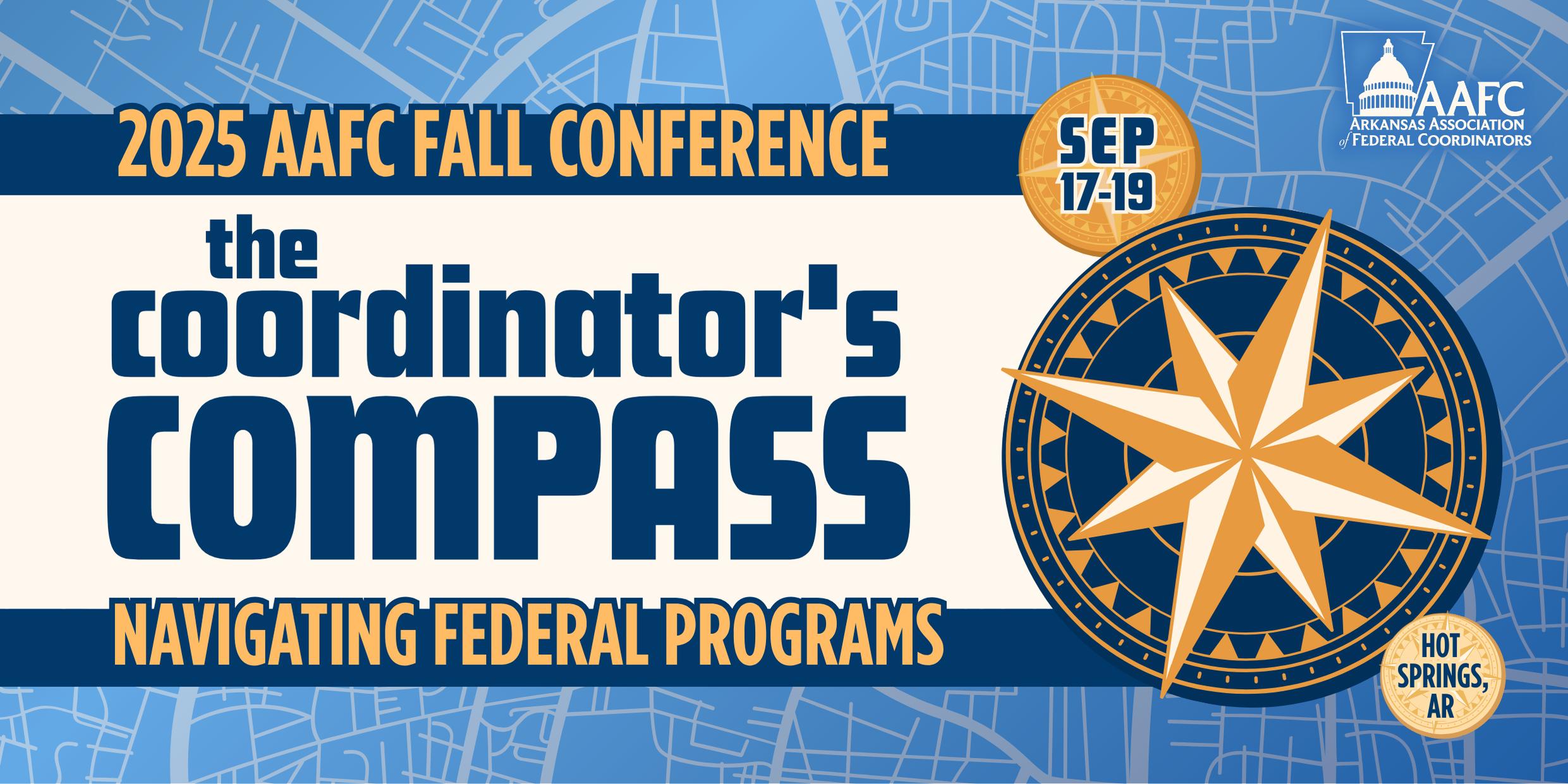


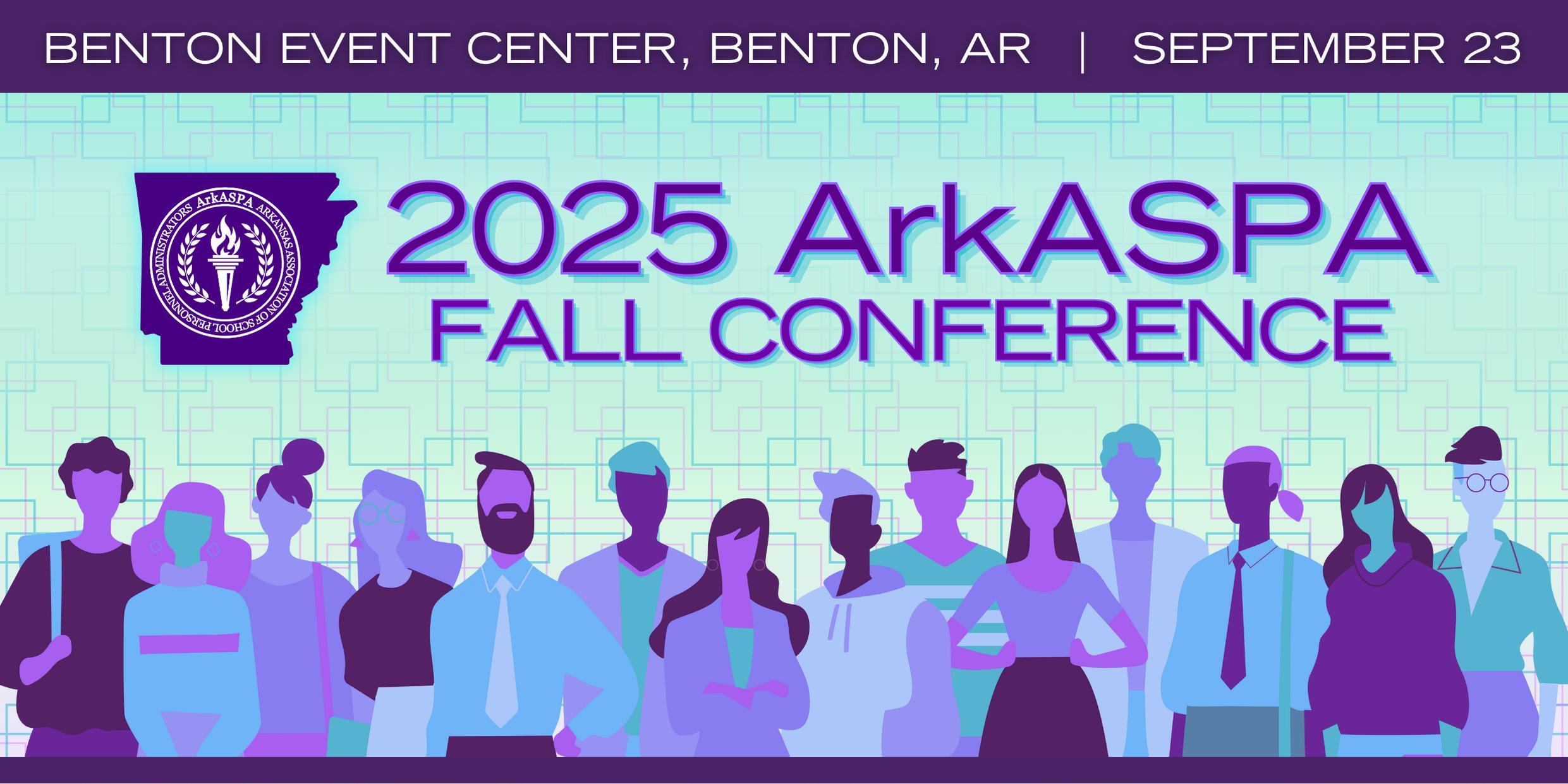






CoSN is a great resource for school technology administrators. Check this page monthly for links to articles to assist technology leaders as they navigate through digital learning transformations.


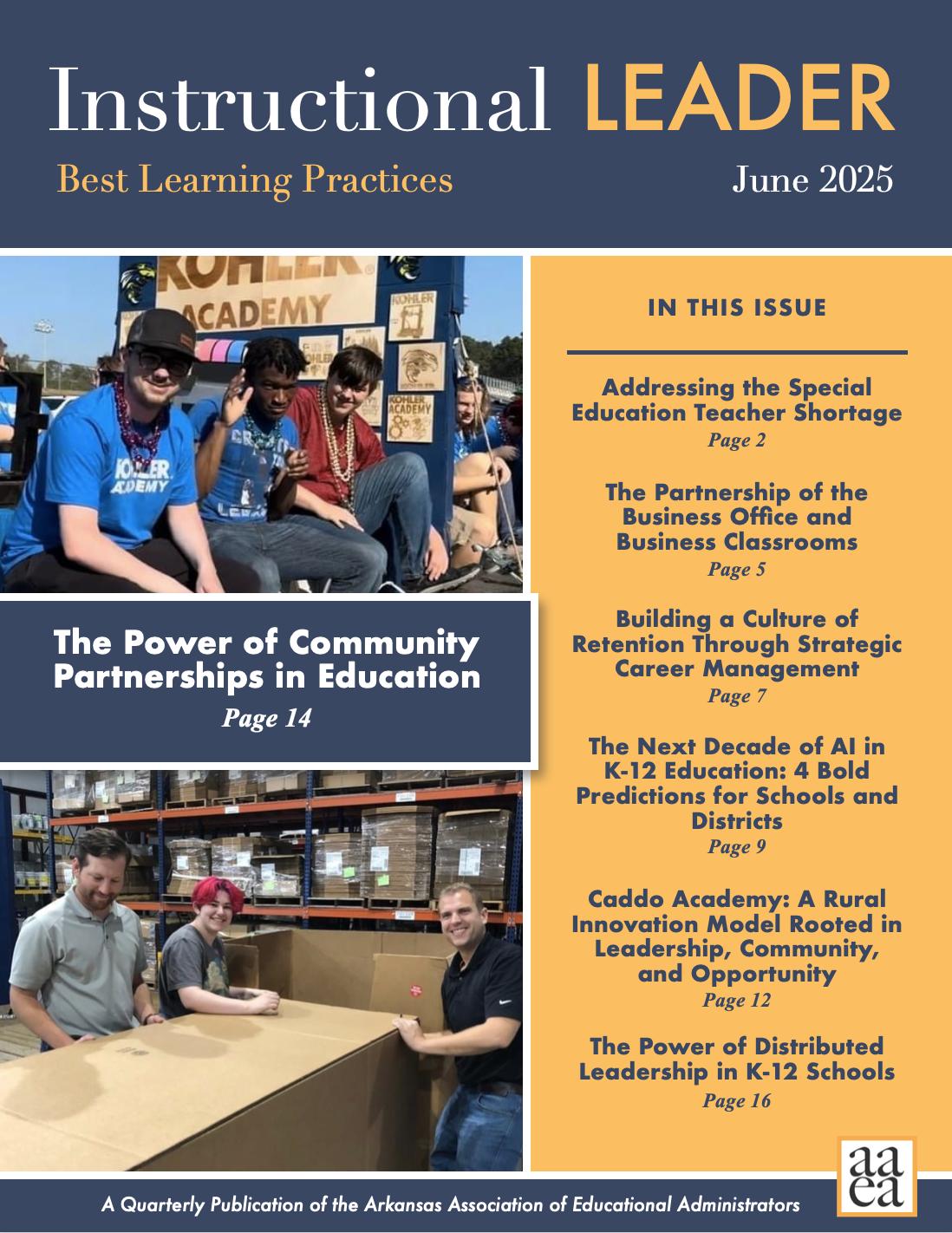
This segment features content from other AAEA publications. Instructional Leader is

between schools and businesses play a crucial role in shaping the future of students. At Sheridan High School, these partnerships are exemplified through the Kohler Academy, a program dedicated to computer-integrated manufacturing and engineering. This collaboration between Kohler and the school has transformed students’ learning experiences by providing state-of-the-art equipment, industry guidance, and real-world applications.
Central to this partnership’s success is the dedicated leadership of Mr. Mike Carpenter, an engineering teacher whose passion and commitment have made a significant impact on students and the broader school community. His ability to foster strong relationships between students, educators, and industry professionals has elevated the program’s effectiveness. Through regular communication with Kohler representatives,
on instruction from experienced professionals who visit the school to facilitate lessons on the machinery and tools used in modern manufacturing.
Kohler’s commitment to student success extends beyond equipment donations and financial support. The company actively engages with Sheridan High School by sending employees into the classroom to train students as they would their own employees. These industry professionals provide direct instruction on advanced manufacturing techniques, safety protocols, and problem-solving strategies. This real-world training ensures that students gain not only theoretical knowledge but also practical, hands-on experience that prepares them for careers in engineering and manufacturing. By learning from experts who work in the field daily, students gain invaluable insights into industry standards, workplace expectations, and career pathways.
Beyond technical instruction, Mr. Carpenter understands the importance of fostering a positive school culture. Each morning, he begins the day by sharing a “dad joke” over the intercom, a simple yet powerful way to bring smiles to students and staff alike. His ability to connect with students extends beyond the classroom, as he mentors them in engineering principles, problem-solving, and career readiness.
A hallmark of the Kohler Academy is its ability to prepare students for the workforce. By engaging in the engineering design process and applying realworld solutions, students gain invaluable experience. They also have the opportunity to earn industryrecognized certifications, work with professionalgrade equipment, and participate in internships that provide a pathway to future careers.
The impact of this program extends beyond the classroom, as students take pride in showcasing their skills through various initiatives. They create products to sell in the Yellowjacket Store, demonstrating both technical and entrepreneurial abilities. Their craftsmanship is also highlighted through the faculty gifts they design and produce throughout the school year, fostering a sense of appreciation within the school community. Additionally, students play an active role in school spirit by manufacturing frisbees to distribute at football games, further connecting their learning to the broader student body.
One of the standout collaborations is the joint effort between students and Kohler in designing the float for the Timberfest parade. This project combines creativity, engineering, and teamwork, allowing students to see their ideas come to life in a community-wide event. These accomplishments not only showcase the students’ technical skills but also their ability to work collaboratively and contribute to the community in meaningful ways.
As Mr. Carpenter approaches retirement, he has taken thoughtful steps to ensure a smooth transition for the program. He has worked closely with Mr. Danny Moffett, another retired engineer, to maintain the high standards of instruction and industry collaboration. Their shared commitment to student success ensures that the Kohler Academy will continue to thrive, preparing future generations of engineers and innovators.
The legacy of Mr. Carpenter is one of dedication, humor, and an unwavering belief in the power of education and community partnerships. His efforts have built a bridge between Sheridan High School and Kohler, creating opportunities that will shape students’ futures for years to come.





Stacy Allen, Director of K-6 Teaching and Learning, Cabot School District, was named the 2025 AACIA Administrator of the Year.

Valerie King, Director of Academic Support and GT Program, Siloam Springs School District, was recognized as the 2025 AAGEA Administrator of the Year.

Jana Lee, Special Services LEA Supervisor, Forrest City School District, was named the 2025 AASEA Winnie Wilson Administrator of the Year.

Dr. Chris Davis, Assistant Superintendent for Human Resources and Campus Support, Fort Smith School District, received the 2025 ArkASPA Administrator of the Year Award.

The AAEA Job Board is a calendar-year subscription that assists districts with the ever-increasing challenge of recruiting quality staff. It is a significant resource for educators, both in-state and out-of-state, seeking employment in Arkansas schools.
Over 165 school districts are participating in the program, which has been extremely helpful to schools and educators over the years. The site is used year-round and is accessed extensively during the second semester. It is not unusual to see over 400 jobs posted on the Job Board at one time. With an account, school districts may post unlimited job vacancies throughout the year.
To subscribe (by district) or to post job openings, contact Lana Webb, Administrative Specialist, at l.webb@theaaea.org or at 501-372-1691.
Siloam School District
Blytheville School District
Trumann School District




